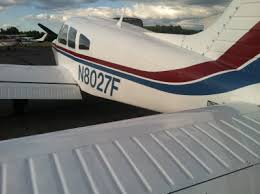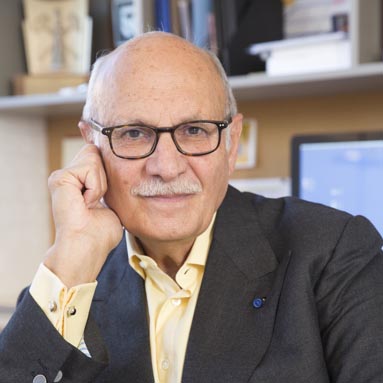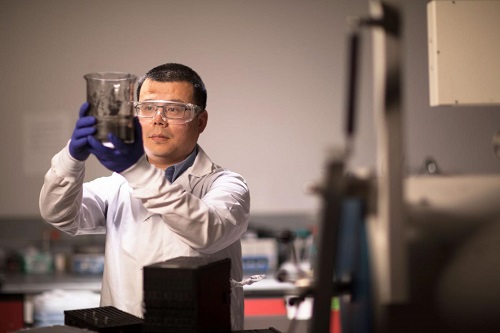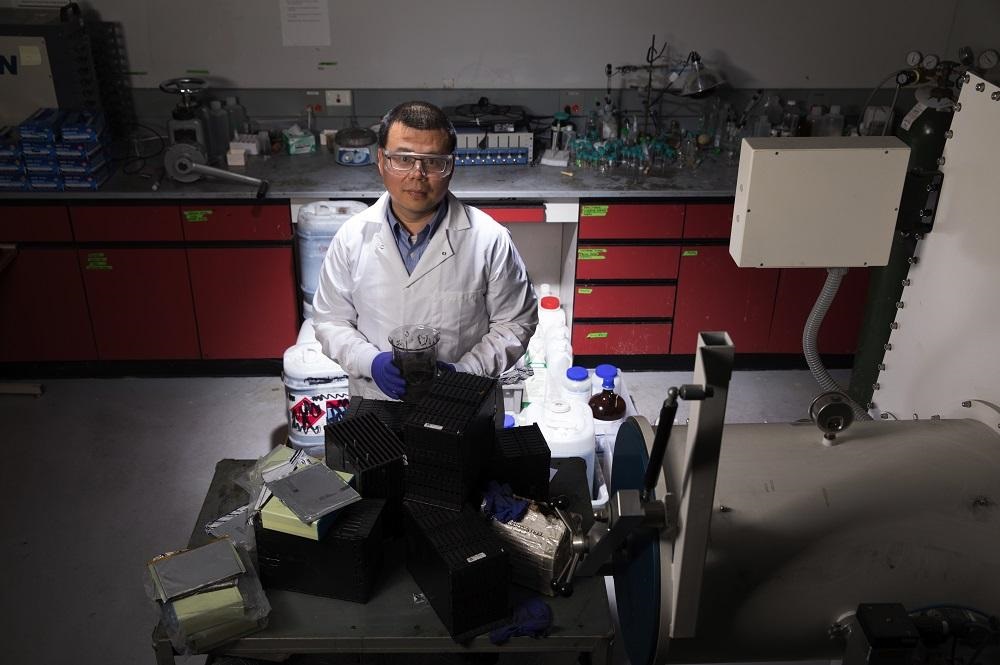Celebrating the “ideas and inventiveness” of its students, faculty, and staff, Worcester Polytechnic Institute (WPI) has recognized two novel research projects with the prestigious Kalenian Award, the university’s top prize which recognizes commercialization potential for a given invention. This year’s honorees, who will share a $20,000 prize purse, include students developing an autonomous aircraft and another group developing a new way to manufacture lithium-ion batteries.
The highly competitive award evaluates the novelty of each submitted concept; its potential in a commercial market; how a business plan could evolve from the idea; and the concept’s likelihood for success. This year, 19 proposals were reviewed and winnowed to the top two:
Autonomous Cargo Aircraft Project
Student Team: Nicholas Cyganski ’17, Benjamin Gillette ’17, Killian Henson ’18, Xavier Little ’19, Erik Nadel ’17, Tyler Nickerson ’17, and Keshuai Xu ’18
Faculty Advisors: Fred Looft, professor of electrical and computer engineering, and Mike Ciaraldi, senior instructor of computer science
 The Autonomous Cargo Aircraft Project (ACAP) is an effort to build the world’s first completely autonomous civilian aircraft, from startup to shut down. The idea started with a real-time economic simulation showing that using a fleet of light autonomous aircraft to carry cargo in the United States, rather than using only wide-bodied jets, would reduce shipping costs by a factor of 4 and increase speed by a factor of 5.
The Autonomous Cargo Aircraft Project (ACAP) is an effort to build the world’s first completely autonomous civilian aircraft, from startup to shut down. The idea started with a real-time economic simulation showing that using a fleet of light autonomous aircraft to carry cargo in the United States, rather than using only wide-bodied jets, would reduce shipping costs by a factor of 4 and increase speed by a factor of 5.
The project, which is funded privately and through university sources, is led by a team of students across six academic majors, drawing expertise from government sponsors, the Federal Aviation Administration, the Aircraft Owners and Pilots Association, and the Experimental Aircraft Association. So far, private investors have made it possible for the team to buy a Piper Cherokee 140 four-seat aircraft, which they store at Worcester Regional Airport. The team’s ultimate goal is to launch the world’s first fly-by-wire general aviation aircraft.
“If you told me three years ago when I started ACAP in my dorm room that I would soon invest over $45,000 of my own money on the project, I would have said you were crazy," said project lead Cyganski, "but I wouldn’t have done it if I didn’t believe in what it can do for society. The Kalenian Prize is just the first step in satisfying our investors, and putting the technology in larger, more capable aircraft.”
Kinetic Batteries
Student Team: Aaron Birt, a PhD Candidate and Ali Valamanesh ’19
Faculty Advisor: Diran Apelian, professor of mechanical engineering and director of WPI’s Metal Processing Institute
 Kinetic Batteries, a company that is commercializing technology invented at WPI, is developing a new way of manufacturing lithium-ion batteries. It is producing lithium-ion battery cathodes, one of the four major battery components, without the traditionally required solvents, polymeric binders, and carbon black. By eliminating these components and changing the way the cathodes are produced, Kinetic Batteries is able to offer unique energetic properties in its batteries with a fraction of the capital cost, as compared to traditional tape casting approaches. The project started in the fall of 2015 and has tremendously advanced the technology in the past year, securing a $40,000 award from the Massachusetts Technology Transfer Center.
Kinetic Batteries, a company that is commercializing technology invented at WPI, is developing a new way of manufacturing lithium-ion batteries. It is producing lithium-ion battery cathodes, one of the four major battery components, without the traditionally required solvents, polymeric binders, and carbon black. By eliminating these components and changing the way the cathodes are produced, Kinetic Batteries is able to offer unique energetic properties in its batteries with a fraction of the capital cost, as compared to traditional tape casting approaches. The project started in the fall of 2015 and has tremendously advanced the technology in the past year, securing a $40,000 award from the Massachusetts Technology Transfer Center.
“With the money awarded to Kinetic Batteries through the Kalenian Award, we will be able to develop a fully functional prototype manufacturing line that we can use as a scaled proof of concept as we engage with our customers in the coming month,” said Birt.
The Kalenian Award was established in 2006 through the generosity of Alba Kalenian in memory of her late husband, Aram ’33, an inventor. It provides seed funds to support and advance the ideas and inventiveness of WPI students, faculty members, and alumni and to encourage similar innovation and entrepreneurship across the academic community. Prior winning ideas have included an early detection device for Alzheimer’s disease and method to produce iron and steel while limiting greenhouse gases. The 2016 Kalenian Award was presented by the Kalenians’ son, Paul, during a recent ceremony.
“Engineers who invent and patent are the focus of the Kalenian Award. Our hope is that these inventors become entrepreneurs, and they build a business, employ, and have great success with their careers,” said Paul Kalenian.
“The Kalenian Award means many things to many people,” said Gina Betti, associate director of the Collaborative for Entrepreneurship & Innovation at WPI, who manages the competition. “For applicants, an award is a validation of their idea. For faculty, it is an opportunity to teach students to prepare a competitive proposal. For Paul, it is seeing his father’s legacy continue.” And for me, it is the chance to engage applicants in a critical thinking process—helping them build trust in an outsider’s perspective.”




